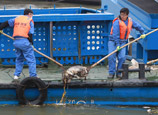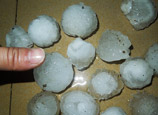
Shanghai authorities have guaranteed the quality of the city's drinking water despite more than 7,500 rotting pig carcasses being found floating on the Huangpu River in the past week.
"We have increased the frequency of water quality examination. Two tests are made each day, and so far the water quality is stable and safe," said Liu Fengqiang, vice-director of Shanghai's Songjiang district's environmental department.
Last week, a large number of dead pigs were found drifting downstream to the upper Songjiang section of Huangpu River from Jiaxing, Zhejiang province. Tests revealed that some pigs may have died from circovirus, a common porcine disease.
Shanghai water authorities said six water intake areas and nine water plants in the Songjiang, Jinshan, Minhang and Fengxian districts were affected. They provide about 2.41 million tons of water for the city each day, accounting for 22 percent of the city's water.
Officials said no hazardous bacteria have been detected, and the water quality meets the national sanitary standards for drinking water.
"The dead pigs were removed quickly. The polluted stream does not affect the water directly around the water plant," Liu said on Thursday.
Officials said circovirus has been added as a key indicator in water quality tests. Other indicators including streptococcus suis, salmonella and E coli O157, are also being tested for.
Some aquatic plant barriers have also been established in the Songjiang section of the river.
Residents remain concerned about water safety.
"I stopped drinking tap water as soon as I heard the news about the dead pigs. In recent days, I've bought bottled water at the supermarket," said Shi Hua, a Songjiang resident.
"No abnormalities have been detected in the tap water. Maybe it's hard to detect. The news really disgusts me," he said.
Shi said he intends to drink bottled water for at least a month.
Liu said: "Residents' concerns are quite understandable. We will continue to closely monitor water quality in case there are any emergencies."
Previous media reports said that people living near the river said it was not the first time they have seen dead animals in the water source.
"The Huangpu River is not a closed pool, and it is also used for transportation, so waste falls into the water," Liu said. "Dead pigs from the upper reaches have previously been seen drifting down to Shanghai, but there were only a few, certainly not as many as this year."
In recent years Shanghai has developed more sources of quality drinking water. The city now gets only 30 percent of its water from the Huangpu River, as opposed to 70 percent previously, he added.
Most of its drinking water comes from the Yangtze River, Qingcaosha Reservoir, Chenhang Reservoir and upper sections of the Huangpu River. The Yangtze River Dongfengxisha Water Source Area is currently under construction.
Liu acknowledged that as the city's population grows, difficulties in maintaining water safety have increased.
"The city's increasing population has posed great challenges to the government to provide safe water for residents," Liu said. "There is a long way to go."
Environmental experts are calling for nation-level legislation to protect water sources and ensure the safety of drinking water.
Statements regarding the protection of water sources have been written into various local regulations. There are currently no specific national level laws for water source protection, experts said.
"The country's legislation on water source protection is still lagging behind. Though provinces and cities have worked out local regulations, they often fail to work when the pollution crosses boundaries," said Zheng Zheng, director of River Basin Pollution Control Research Center of Fudan University.
The problem not only exists in Shanghai, but in many other parts of the country, Zheng said.
"Pollution risks can occur in upper streams at any time, which puts pressure on the lower stream," he said. "The different responsibilities required for looking after upper streams and lower streams should be clarified through a special law."
Xia Tao, a member of the Central Committee of the Revolutionary Committee of the Chinese Kuomintang, and vice-chairman of Anhui province's Chinese People's Political Consultative Conference Committee, also called for a comprehensive management body to be placed in charge of protecting and managing drinking water sources.
The ecological protection of drinking water sources involves many aspects, such as the management of water sources, the monitoring of the whole river, a prevention system and emergency methods, he said.
While there are related laws and regulations, many are not complete and punishments are not harsh. There is also too little being done to prevent pollution, he said.
















 Hailstones measuring 7 cm in diameter hit SW China
Hailstones measuring 7 cm in diameter hit SW China


![]()
